On Tuesday 11 November, members of the KIN Pact came together for a special and intensive Do-It-Together Day. It was a gathering that went beyond sharing knowledge or catching up: participants deliberately stepped out of their daily work rhythm to practise a different way of looking, listening and working together. The aim? Sharpening our transition mindsets.
Participants from a wide range of disciplines (from researchers and policy officers to team coaches, legal professionals and practitioners) met at Kanaal30 in Utrecht. Around one third of the group came from societal organisations, one third from the knowledge or public sector, and one third from creative or independent organisations. For many, it was valuable to finally meet the people they regularly collaborate with.
The programme: what did we do and why? Conditions for transitions
The day revolved around one central question:
How do we create the conditions needed for real transitions?
Transitions are not just about new knowledge or technical solutions. They require new ways of collaborating, handling uncertainty, and adopting different perspectives. That is exactly what we explored and practised throughout the day.
The programme was intentionally designed to connect head, heart and action:
- Morning programme with the working groups: Exchange on the phase each network is currently in, supported by insights from Sara Miellet from the Research Group on Networks for Transitions (HU).
- Joint opening & introduction: On the importance of learning together, connecting and accelerating.
- Reflective exercises: Creating Another World and Shoulder to Shoulder, guided by Anne Graswinckel and Marsha Simon.
- Transition workshops: Interactive sessions focused on transition skills, perspective-shifting and new ways of collaborating.
- Group reflection: A collective harvest of insights: what do we take back to our own practice?
- Drinks and informal exchange: Time to deepen relationships and let ideas settle.
The atmosphere was warm, open and curious. There was listening, laughter, grappling with assignments, and moments of quiet when something struck or surprised people.
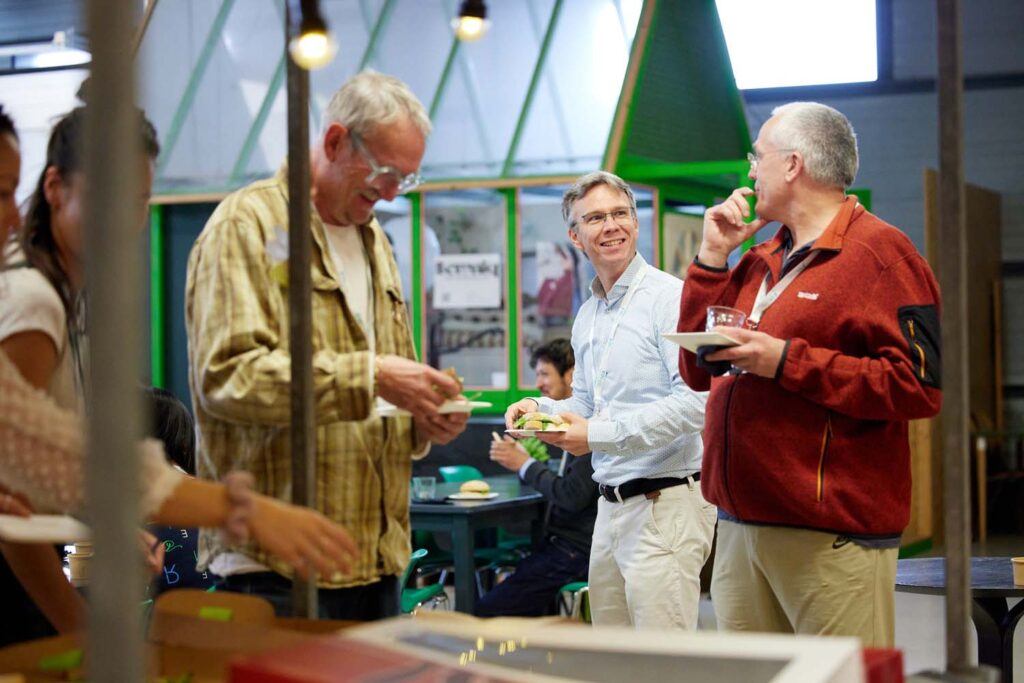
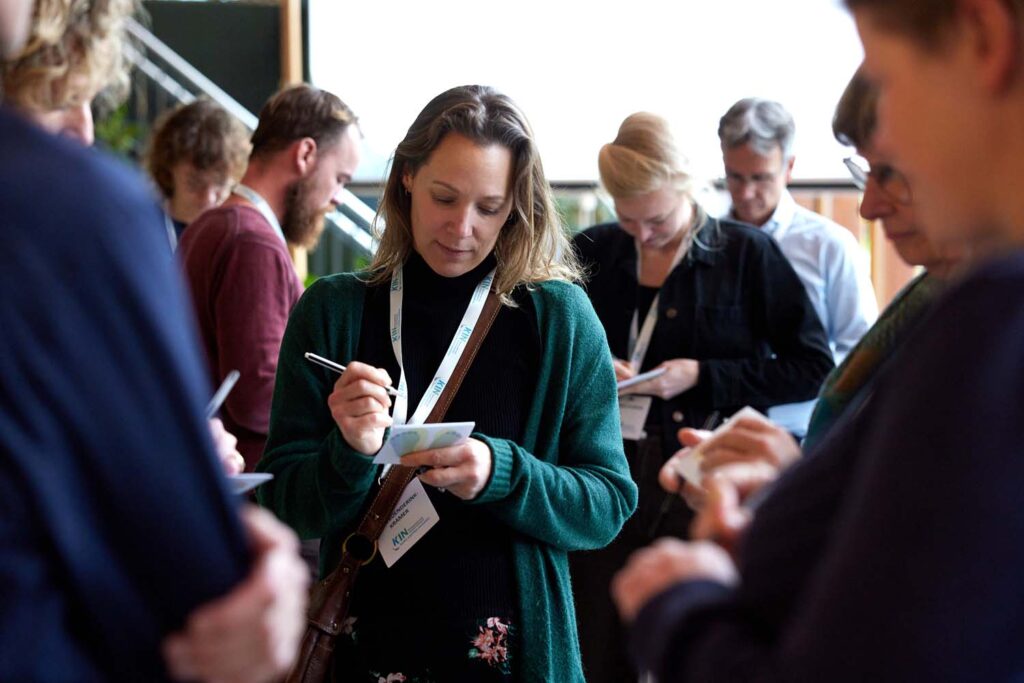
Key insights from the sessions
Morning session: Exchange between working groups
In the closed morning session, Pact members representing seven working groups shared where they currently stand in their collaboration. Sara Miellet opened with an introduction to network development and transition processes, which many found surprisingly relatable.
What stood out is how closely the intuitive steps taken by working groups align with scientific insights on network formation. Despite very different themes, many groups face similar process-related challenges. The discussions were lively, open and honest.
Welcome & introduction
During the opening, Michiel and the Pact team explained why a day like this is essential: we cannot afford to keep working in isolated pockets. Collaboration across disciplines, roles and approaches is the only way to accelerate climate futures. This was underlined by Pact team members Björk and Sem (who joined in November as community manager). As Björk put it: “The Pact belongs to all of you.” Sem added that transitions require a willingness to work differently, to understand what drives others, and to improvise when needed.
The invitation for the day was clear: seek each other out, learn from one another, and allow yourself to be surprised by new ways of seeing.
Creating Another World & Shoulder to Shoulder
These opening exercises invited participants to step into collaboration straight away and experiment with different ways of thinking. Guided by Anne Graswinckel and Marsha Simon, participants explored two exercises centred on reflection, listening and making uncertainties and certainties visible.
The assignments intentionally created a sense of discomfort. Standing shoulder to shoulder, not facing each other, and speaking silently about uncertainties and certainties—the contrast was striking. Uncertainties were spoken more softly, certainties louder and more confidently. Not everyone used the full time; the silences turned out to be meaningful too.
For transitions, it is essential to:
- listen without responding immediately,
- recognise and acknowledge different perspectives,
- and develop comfort with uncertainty.
These exercises made that both visible and tangible.
Transition workshops
The afternoon consisted of seven interactive workshops, each designed to let participants experience new ways of working rather than merely understand them conceptually.
Making it Right: From Local Values to Global Perspectives (by Anna Melnyk and Camilo Benitez Avila, TUD Design for Values)
In this English-language workshop, participants created collages: first on values they consider important for the Dutch energy transition, then on what those values mean in the countries where materials are extracted.
Using images made the conversation accessible. Many realised that their first collage was largely framed by local perspectives. Once the global context was added, the discussion shifted immediately. Questions emerged about responsibility, fairness and who bears the burden of our choices. A reflective session that broadened perspectives without complex theory.
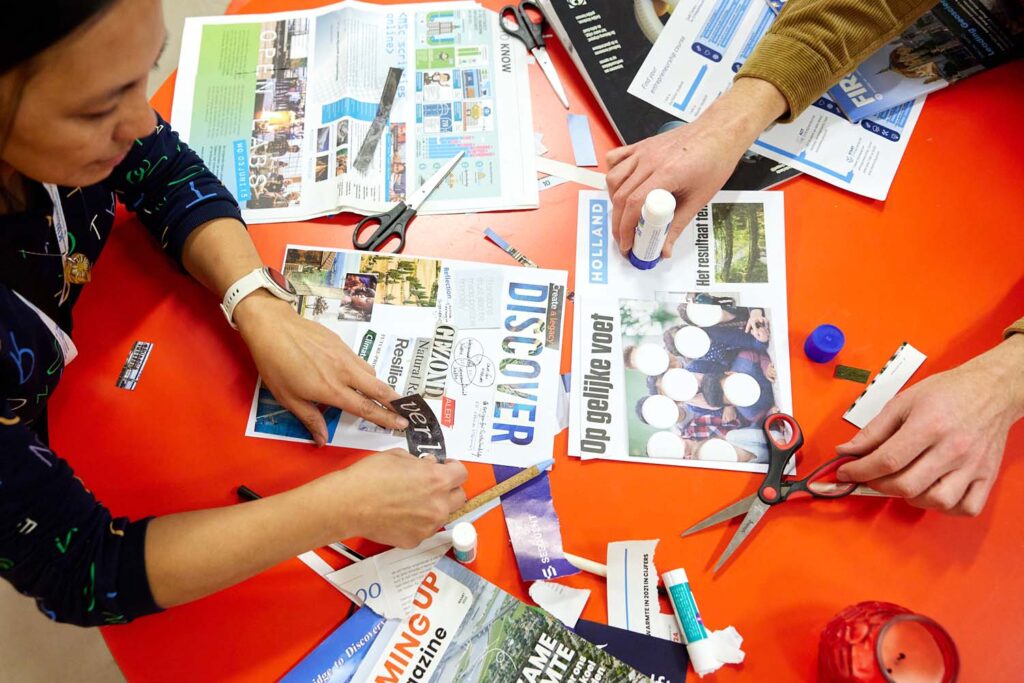
Activate Hope and Embrace Reality (by Leonie Stekelenburg)
This session centred the body. Participants explored the physical signals they feel during tension or uncertainty, and how that influences collaboration. A few simple exercises revealed how quickly one can slip into a reactive state—and how to return to connection.
What stood out again was how universally recognisable these experiences were. The atmosphere remained calm and open; people shared what they noticed without hesitation. The session offered a clear insight: meaningful collaboration starts with knowing where you yourself stand.
Make Connection and Impact: Climate Conversations (by Francine Linssen & Manu Busschots)
You know that moment when someone mentions “sustainability” and you immediately feel tension? That is exactly where this workshop began. Francine and Manu explained why climate conversations often feel uncomfortable—and why that does not mean you are doing anything wrong. Participants then applied the ideas to their own real-life cases.
What stood out? A sense of relief once people understood where that knot in their stomach comes from. And how quickly it became easier to practise. The atmosphere was open and honest; people recognised each other’s doubts and ambitions. A compact session that brought surprising calm to a topic that often feels heavy.
Make It Work: Accelerating Transitions Through Task Democracy (by Peter Bootsma)
Peter Bootsma introduced task democracy as an approach in which different groups in society each take responsibility without drowning each other out. Participants stepped into roles—government, residents, companies, researchers—and had to make decisions together.
It quickly became clear how differently you view an issue when you adopt a single, clearly defined role. The exercise revealed where collaboration flows and where it gets stuck. The atmosphere was active and curious, with participants building on each other’s ideas. A compact introduction to a way of decision-making that was new to many.
Create Wonder: What Would the Forest Do? (by Philippe Rol, Groene Grond)
Through ecopsychology, participants learned to view situations from the perspective of the forest: a fungus, a root system, a bird, a deer. The exercise had two parts: first being the thing you choose, then responding as the forest would respond. Quite literally—participants embodied oyster mushrooms, dogs and more.
People noticed how conversations shift when you begin by sensing and listening instead of responding cognitively. The forest works through connection, cycles and reciprocity. The session was experienced as clarifying, playful and surprisingly deep.
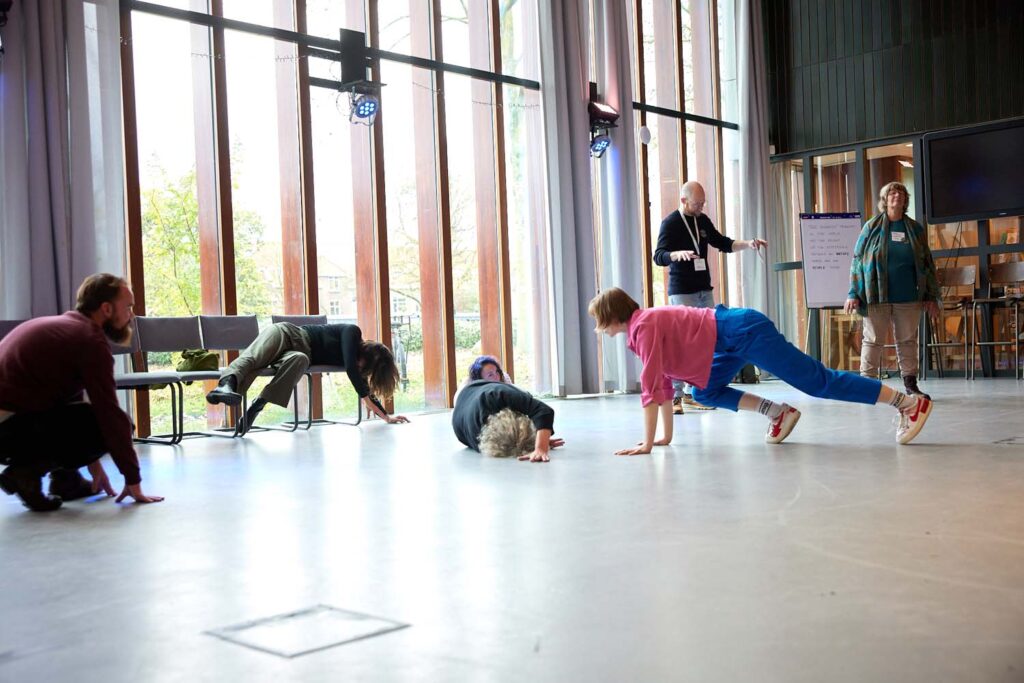
Make It Together: Destabilising as a Skill (by Peter Slenders & Berry Trip, To Get There)
This workshop framed difference not as a barrier but as a starting point. The first assignment: one person had to name the uncomfortable or divergent perspective. After a few seconds of hesitation, someone did—and the entire group visibly relaxed.
Participants discovered that once the unspoken is voiced, conversations become clearer rather than more complicated. It became evident that collaboration does not improve by avoiding tension but by naming it. A simple session in form, yet one that prompted many working groups to reflect on their own dynamics.
Making it real: New rituals for transitions (by Dieke Schutjens & Aylin Özalp, Squarewise)
Using a game format, the group collectively designed a ritual for a moment of transition. Although the setup was playful, everyone was deeply engaged. Participants approached both the game and the emerging ritual with seriousness and attentiveness.
The workshop opened up wide-ranging conversations about the significance of rituals: what a ritual actually is, and in which situations we ourselves might feel the need for one. And the best part: after developing the ritual, the group performed it together.
The workshop concluded with participants looking at themselves in a mirror as part of the ritual we had created. This final act led to a thoughtful and connecting closing conversation.
Group reflection: What do we take into tomorrow?
In the final reflection session, we gathered insights from past, present and future:
- What creates uncertainty in our current work?
- Where did we previously experience flow, and what does that say about how we want to work now?
- What does the future ask of us as individuals and as a network?
The time was short, the discussions intense, yet a clear harvest emerged:
accelerating together requires slowing down together, listening, and creating space for shifting perspectives.
The five councils that emerged were:
- Move outside, sense, learn, repeat
- Come together more often to find common ground and include (or celebrate) differences
- Visualise and articulate a future we collectively move towards, playfully and iteratively
- Find compelling purposes that fit the wider movement
- Facilitate cross-transdisciplinary communities face to face—from the Dutch context to the global one (impact matters)
The closing assignment (writing down an insight, exchanging envelopes and later adding a mentoring reflection) provided a soft and reflective ending to a full day.
Drinks & informal closing
The drinks offered space to continue conversations, deepen connections and let ideas settle. Many participants stayed longer than planned, which says a lot about the energy of the day. Everyone went home with new insights, practical tools for collaboration, and a sustainable goodie bag with a plant cutting—a playful reminder of “planting an ideal”.
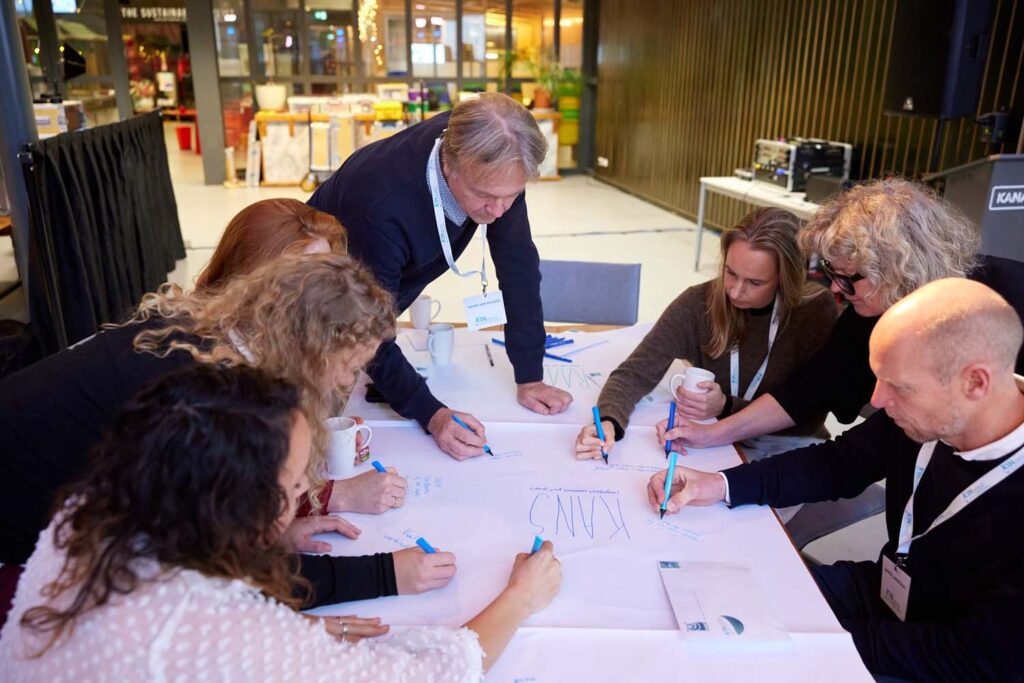
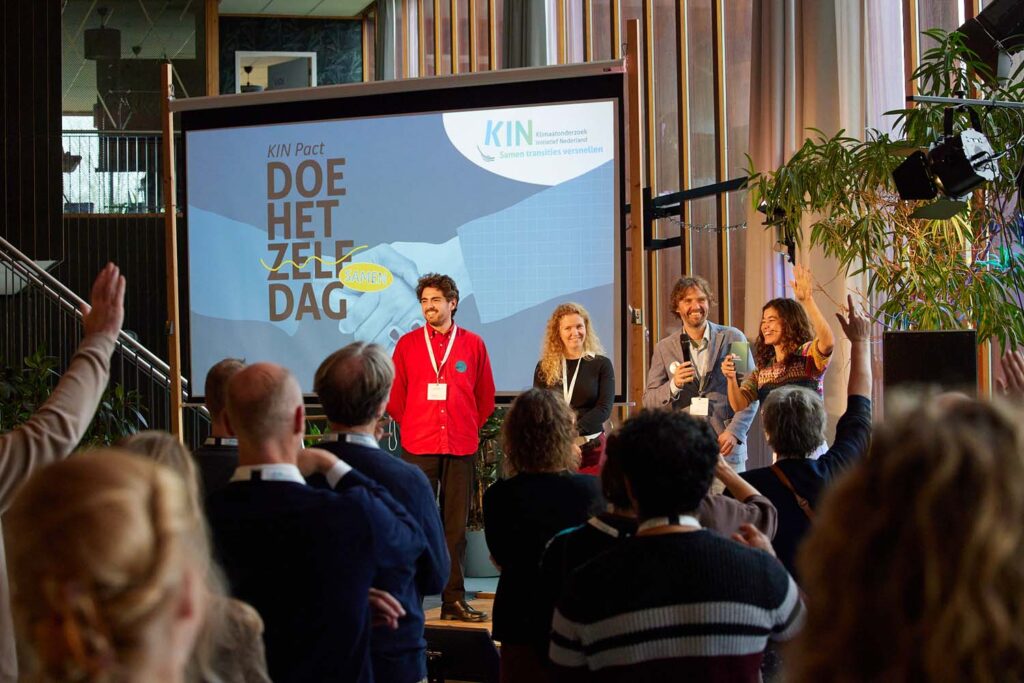
We are not standing still
In the coming period, we will focus on:
- Gathering feedback from the survey.
- Further supporting working groups in their development.
- Facilitating follow-up sessions for Pact members, such as theme days and network meetings.
- Making the materials used during the Pact Day accessible.
We continue building a Pact community where experimentation, learning and collaboration take centre stage. This day once again showed how needed and desired that is.
Will you join the Pact?
Would you like to take part in Pact days like this more often? The Pact organises several gatherings each year where:
- you learn new methods and skills essential for transitions,
- you meet colleagues from science, policy, practice and business,
- and you collaborate on questions that no single discipline can solve alone.
This is in addition to all the inspiring events organised within the working groups. Joining the Pact is free but not without commitment. Read more about the Pact here: hetkin.nl/pact and sign up directly here: hetkin.nl/pact-inschrijven
Photography: Marieke Duijsters

